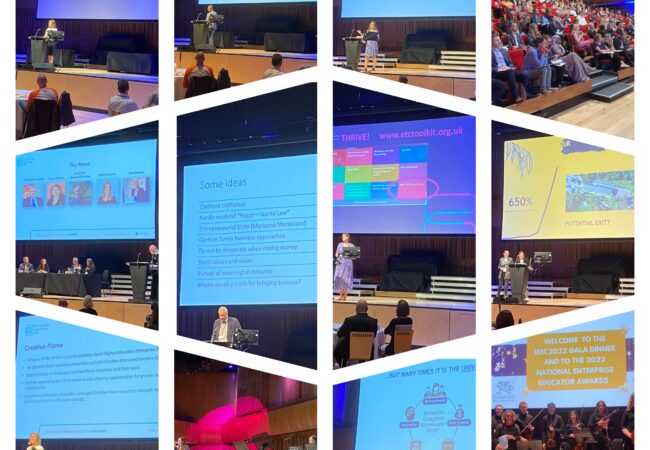
IEEC brings together enterprise educators in all their roles, be that practitioner, influencer or academic, for key discussions that explore how to deliver for staff and students, whether nationally, internationally, in the class room, outside the curriculum or hybrid/online.
Those working in accelerators or incubators will be interested in the latest CentreforEntrepreneurs report that highlights their growth and impact in each nation state, with 1 in 20 new businesses receiving support.
Whilst the 2022 IEEC session policy overview is primarily aimed at our UK Membership, it is clear that the lessons of ‘nations’ can often be drawn as parallels for institutional practice (such as having a clear strategy and mobilising your champions!) just as those of key bodies/entities can be insightful for crafting individual approaches. So post-IEEC, there is always much to reflect upon as term starts – whether it is the significance of a key appointment (such as Chief Entrepreneur Scotland) or the experience of those working externally (engaging with SMES (KEF (see EEUK blog on SEE) and seeing those approaches) articulated within the KEF Concordats (see NCUB KEC report ).
Appreciating the educational pipeline (using APPG reports on HEI and School Enterprise Education) helps us recognise the importance of EntEd as a lifelong skill and EEUK welcomes how it forms part of many new QAA benchmark statements (see Prof Andy Penaluna’s EEUK blog) and underpins our shared resources such as ETCToolkit, as now populated by EEUK Fellowship
Sharing key resources, such as GreenComp and EEUK EntreComp into Action and GreenComp mapping (Prof Andy Penaluna) or new frameworks (2B Framework linking DigComp and EntreComp) helps to guide our practice and connect EEUK members to the EntreComp community. But it is the deeper reflection on inclusion (defined here by WONKHE; inspired by the Henley Business School Report Equity Effect (2021) that demands we reflect upon our curriculum design, timetabling/scheduling, and wider approach to ensure that we include all in our ambitions. Reviewing the latest Office for Students Knowledge Exchange Evaluation reports of recent funded HEI projects highlights many key lessons, around language and clarity with students which “reject the exclusionary potential of the ‘just do it’ attitude” (Brentnall 2022) that we have transposed from business practice into #ented and our IEEC policy session invites the EEUK membership to consider how we create an environment in which all students can thrive.
Alison Price
Head of Policy and Professional Development
https://twitter.com/AlisonEntEv
